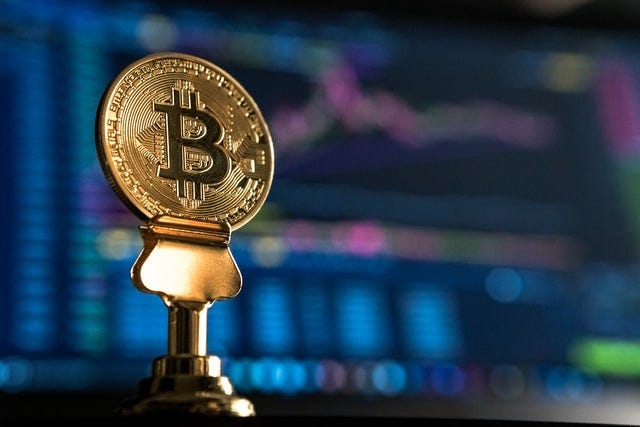Welcome to our #100 weekly newsletter.
“For women taking control of their financial future”
-Jana Hlistova
From The Purse
In this week’s newsletter, we focus on the current economic uncertainty and what this means for the price of bitcoin.
The crypto market is usually uncorrelated to financial markets. So what is going on? Investors are selling their technology stocks and bitcoin.
You can review the news in brief so you stay on top of global financial, economic and investing trends.
And watch out for our interview with Heather McGregor, CBE (aka Mrs Moneypenny) on The Purse Podcast tomorrow.
I hope you enjoy this week’s newsletter.
Until next week,
Jana
Economic uncertainty: why bitcoin and the Nasdaq index are closely correlated right now
Rising inflation, the tapering back of bond purchases and rising interest rates provides the context for the falling price in bitcoin
Bitcoin is down more than 50% from its all-time high ie $68,000+ in November. And almost $600bn is wiped off its value.
This is not the first time bitcoin has had a 50% drawdown. The first time was in 2018, then in 2020, 2021 and now in 2022.
It is important to understand the economic context, keep things in perspective and avoid ‘the panic’.
Bitcoin hodlers have seen this before. And continue to hold.
Let’s put this in context
The pandemic has been a disaster for the global economy.
After the markets crashed in March 2020, central banks and governments stepped in to avoid a complete economic and financial market meltdown.
They reduced interest rates to zero or close to it, introduced stimulus and started printing money (quantitative easing).
Printing money essentially pumps liquidity into the markets.
Put another way, central banks buy government and corporate bonds from other financial companies and pension funds.
This has pushed up the level of government debt and the money supply in the economy. And debased global currency.
In other words, the value of fiat currency is falling. And the purchasing power of the average consumer is being eroded.
And, inflation is rising around the world
In the US, inflation is at 7%, the fastest increase in 40 years.
And in the UK, inflation has risen to 5.4% -the highest level in almost 30 years (expected to be 6%+ by spring).
The central banks have been slow to respond, until recently, saying that ‘inflation is transitory’.
The Bank of England (BoE) increased the base rate from 0.1% to 0.25% in December and halted the bond purchasing or money printing programme.
The US Federal Reserve has started tapering back its bond purchases (this will complete in March 2022) and has said that there will be interest rate hikes this year. The first is expected in March.
The ongoing uncertainty in the market…
… is making investors uneasy.
This past week, global equities suffered their biggest declines in more than a year.
The tech-heavy Nasdaq index fell by 7.6% this week, which is the biggest slide since the pandemic rocked the global markets in March 2020.
Bitcoin has now hit an all-time high correlation to the Nasdaq index.
A key narrative for crypto investing is that it is largely uncorrelated to the stock market. For example, as the S&P 500 or Nasdaq goes down, the bitcoin market should remain unaffected ie price is stable or continues going up.
However, this is not what we are seeing right now.
Why is that?
There is no immediate driver for more capital inflows or investing into bitcoin.
The macro investor, Raoul Pal, had anticipated that we would see more institutional money flowing into bitcoin and ethereum in January.
However, the economic uncertainty of rising interest rates and the tapering back of money printing, means that professional investors are cautious (and nervous).
And so we see them selling ‘risk-off assets' such as growth assets ie technology stocks and buying value stocks instead.
They are opting for a more defensive strategy in an uncertain market.
Bitcoin, therefore, is currently deemed as a ‘risk-off’ asset by institutional investors.
Hence why bitcoin and the Nasdaq is so closely correlated right now.
We can only speculate…
…. about what might happen next.
However, once investors have more clarity and comfort around what the central banks will do and when, we expect to see an influx of capital into bitcoin and the price to start rising again.
As bitcoin is a fixed supply asset (with 21m coins only), we know that when demand goes up, so will the price (of the asset).
News in Brief
Financial news
Global equities suffered their biggest declines in more than a year. Heavy losses in Netflix, accentuated a sell-off in tech stocks.
The tech-heavy Nasdaq Composite index fell 7.6% this week, its biggest slide since the coronavirus pandemic rocked US financial markets in March 2020.
The FTSE All-World index of developed and emerging market shares has fallen 4.2% since last Friday.
The combined market cap of FANGMAN has plunged below $10tn in latest tech rout. In less than a month, $1.6tn in value was erased. (The nearly 15% plunge in the Nasdaq Index since November high hurts those who got in in March 2020. Those who have been invested since the turn of the millennium consider this to be only a minor correction).
UK: wages fell below inflation in November. Consumer price inflation (CPI) jumped to 5.1% in November, and is expected to hit 6%+ by this spring when energy bills rise very sharply.
Crypto: bitcoin, ethereum, DeFi & NFTs
Crypto market drawdown: fall in prices has wiped more than $1trn in market cap, since early November. Macro investors, such as Raoul Pal argue that investors are fearful of central banks tapering back bond purchases and interest rate hikes.
Bitcoin prices plunged from around $41,000 Thursday to below $36,000 by Friday. (See the current bitcoin price).
Ethereum, the second largest cryptocurrency fell 20%+ to below $2,500.
UK cracks down on misleading cryptocurrency adverts. The UK government has outlined plans to protect consumers from misleading claims by tightening rules over cryptocurrency adverts
JP Morgan says that Ethereum is losing NFT marketshare to Solana, because of congestion and high gas fees. The network’s market share of NFTs has dropped to around 80% from about 95% at the start of 2021.
Jefferies sees NFT market reaching more than $80bn in value by 2025. The bank raised its NFT market-cap forecast to more than $35bn for 2022 and to over $80bn for 2025.
Coffee Break? Read This
Menopause strains UK workforce with some women planning to quit
Female leadership is good for the world. Just look at Barbados
Only two UK Covid briefings are led by a female MP, report finds
We’d love to hear from you. Get in touch with Jana via the The Purse website or tweet @jointhepurse and @janicka.
The Purse Ltd. Copyright 2022 & All Rights Reserved.
The Purse provides content for informational purposes only, we do not recommend products or services or provide investment advice. Please do your own research or speak to a financial advisor.
















Share this post